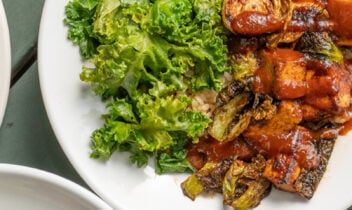TheBUZZ Raisins don’t cause cavities?
WHAT THEY’RE SAYING
New research suggests that raisins do not cause cavities. Some people steer clear of raisins because of their sticky consistency, but eating raisins does not increase your chances of getting cavities.
WHAT WE KNOW
A recent article published in Institute Food Technologies explored the topic of raisins and oral health because little research has been done since the 1950s.* The state of your oral health is influenced by many factors. Before a cavity forms, there are three conditions that are thought to contribute to the formation of dental caries, or cavities.
3 Ways Cavities Form
- Low oral pH
- Adherence of food to teeth
- Biofilm (bacterial) behavior
HOW DO WE KNOW THIS?
Low oral pH means an acidic oral environment. Cavities happen when acid-producing bacteria settle into the tooth and dissolve the enamel, or protective covering of the tooth, which leaves a hole in the tooth’s surface. Certain carbohydrates (especially sucrose – also known as table sugar) increase acid production by bacteria in the mouth. The carbohydrate in raisins is mostly in the form of glucose and fructose which is thought to not be used as readily by the bacteria.
We all know that raisins are sticky! Again, there are different factors that determine the adherence of a food to teeth, including adhesiveness, chewiness, thickness, and moisture content. Foods that are very thick, chewy, and sticky latch onto teeth and may lead to cavities. However, there is little correlation between the perceived stickiness of a food and whether the food actually sticks to your teeth. Raisins, like other fruits and vegetables, are rapidly cleared from the mouth, and actually help clear out other foods that do cause cavities.
Cavities can be the result of bacterial imbalance. Your biofilm, or the thin, slimy film of bacteria that adheres to the surface of your teeth, influences whether or not you will develop cavities. Your biofilm is the result of your own biological makeup. As you grow, what you eat influences the biofilm, which can be either positive or negative. When you eat foods that cause bacteria in the mouth to produce acids, you increase the risk of developing cavities. Raisins contain several compounds that positively impact the biofilm and benefit overall oral health.
THE BOTTOM LINE
Fruits and vegetables improve overall oral health by promoting strong teeth and gums. Remember to make half your plate fruits and vegetables every time you eat. Raisins and other dried fruit add variety to your daily fruit consumption. They provide similar nutrition as their fresh counterparts, but in a more concentrated way.
5 Ways to Add Raisins to Your Day
- Add a small amount to your oatmeal, cereal, or yogurt
- Mix raisins and peanuts in a baggie as a quick and easy snack on the go
- Mix into breads or cakes before baking to add moisture and flavor
- Combine with chicken dishes to add an exotic, sweet twist to traditional dishes
- Sprinkle on top of a salad
Related
Fruit & Veggie Recipe Database
Sunmaid Recipes
California Raisin Recipes
*Wong, A., D. Young, D. Emmanouil, et al. (2013). “Raisins and oral health.” Institute of Food Technologies,
J Food Sci. 78(51), 26-29. doi: 10.1111/1750-3841.12152.
View Abstract 

